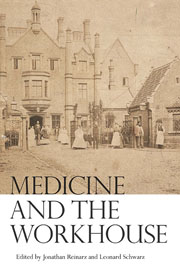Book contents
- Frontmatter
- Contents
- Preface
- Introduction
- Part One The Old Poor Law
- Part Two The New Poor Law
- 6 Workhouse Medicine in Ireland: A Preliminary Analysis, 1850–1914
- 7 Exploring Medical Care in the Nineteenth-Century Provincial Workhouse: A View from Birmingham
- 8 “Immediate Death or a Life of Torture Are the Consequences of the System”: The Bridgwater Union Scandal and Policy Change
- 9 Practitioners and Paupers: Medicine at the Leicester Union Workhouse, 1867–1905
- 10 Workhouse Medicine in the British Caribbean, 1834–38
- 11 Poverty, Medicine, and the Workhouse in the Eighteenth and Nineteenth Centuries: An Afterword
- Selected Bibliography
- List of Contributors
- Index
9 - Practitioners and Paupers: Medicine at the Leicester Union Workhouse, 1867–1905
from Part Two - The New Poor Law
Published online by Cambridge University Press: 05 December 2013
- Frontmatter
- Contents
- Preface
- Introduction
- Part One The Old Poor Law
- Part Two The New Poor Law
- 6 Workhouse Medicine in Ireland: A Preliminary Analysis, 1850–1914
- 7 Exploring Medical Care in the Nineteenth-Century Provincial Workhouse: A View from Birmingham
- 8 “Immediate Death or a Life of Torture Are the Consequences of the System”: The Bridgwater Union Scandal and Policy Change
- 9 Practitioners and Paupers: Medicine at the Leicester Union Workhouse, 1867–1905
- 10 Workhouse Medicine in the British Caribbean, 1834–38
- 11 Poverty, Medicine, and the Workhouse in the Eighteenth and Nineteenth Centuries: An Afterword
- Selected Bibliography
- List of Contributors
- Index
Summary
The Status of Workhouse Medicine
In England and Wales the Poor Law Amendment Act (1834) required all unions to appoint a medical officer to attend the sick in the workhouse. The 1842 General Medical Order required poor law medical officers to be doubly qualified in both medicine and surgery, which often meant that they were better trained than other local private practitioners, who may have had only one qualification. The requirement to be doubly qualified did not, however, bestow a high status on the post, nor was it rewarded by a significant or even standard scale of remuneration. Despite working in a profession that gradually rose in esteem during the nineteenth century and despite being the only trained and qualified workhouse officers, medical officers remained subservient to lay poor law guardians. Furthermore, medical relief orders for paupers were made by nonmedical relieving officers. As Irvine Loudon points out, the status of an individual general practitioner was dependent on his income and the class of patient he treated. Consequently, the lack of medical autonomy experienced by workhouse medical officers, along with their acceptance of lowly paid posts and their willingness to treat the poorest patients, undermined their status among the medical profession, which was itself concerned to establish its authority within hospitals and society in general.
- Type
- Chapter
- Information
- Medicine and the Workhouse , pp. 192 - 211Publisher: Boydell & BrewerPrint publication year: 2013



